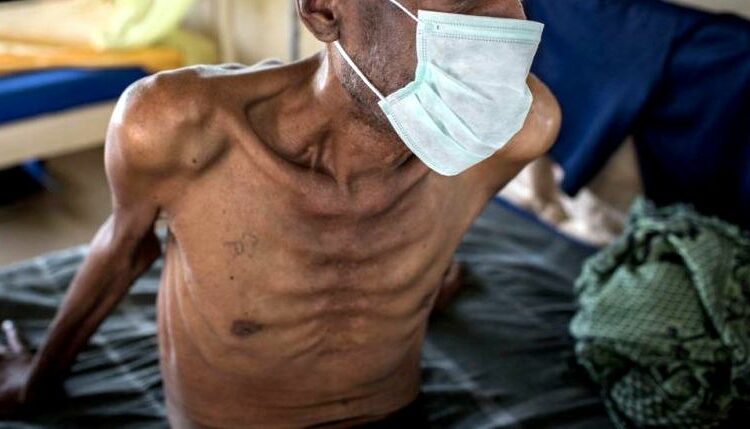In spite of concerted partnerships to stamp out tuberculosis (TB) in Nigeria, stakeholders are worried it still kills thousands in the country.
According to the National Tuberculosis, Leprosy and Buruli Ulcer Control Programme (NTBLCP), the disease, discovered 143 years ago, claims 71,000 lives annually in Nigeria, accounting for 18 per cent of TB-related deaths in Africa.
When the late Malam Ibrahim Yusuf, a 32-year-old mechanic in No Man’s Land, Fagge Local Government Area, Kano State, first developed a persistent cough, he dismissed it as a minor infection.
His wife, Mrs Safiya Ibrahim, recounted how his condition deteriorated over time.
“By the time we finally visited the health facility, he was diagnosed with tuberculosis (TB) in its advanced stage.
“Despite undergoing treatment, my husband died three months later, leaving behind me and our three children,” she narrated.
According to the World Health Organisation (WHO), TB is an infectious disease caused by the bacterium Mycobacterium tuberculosis.
It primarily affects the lungs but can spread to other organs such as the brain, spine and kidneys.
TB spreads through the air when an infected person coughs, sneezes, speaks or sings.
Experts say there are two types of TB– Latent TB, where the bacteria remains inactive, causing no symptoms and making the person non-contagious, and Active TB – where the bacteria multiply, leading to a persistent cough, weight loss, night sweats, fever and fatigue.
The latter is contagious and requires immediate treatment.
Medical professionals say TB is curable with a six-month course of antibiotics, including drugs like isoniazid and rifampicin.
They say the BCG vaccine offers partial protection, especially for children, while early diagnosis through tests like GeneXpert and sputum microscopy is crucial in preventing transmission.
Despite medical advances, TB remains a major public health crisis in Nigeria.
Ibrahim’s story is just one among thousands in Nigeria, where TB remains a leading cause of death despite being preventable and curable.
In 2023 alone, 499,000 Nigerians were diagnosed with TB—five people every minute.
However, only 60 per cent of cases were detected, meaning hundreds of thousands remain undiagnosed, posing a risk of further transmission.
Nigeria is also battling a rise in Multidrug-Resistant TB (MDR-TB) and Extensively Drug-Resistant TB (XDR-TB).
MDR-TB occurs when TB bacteria become resistant to first-line drugs like isoniazid and rifampicin, making treatment longer, more expensive and less effective.
According to WHO, no fewer than 21,000 Nigerians develop MDR-TB each year, but only about 2,600 receive proper treatment due to funding shortages, limited diagnostic tools and inadequate second-line medications.
Dr Adesigbin Clement Olufemi, Head of the Programmatic Management of Drug-Resistant Tuberculosis (PMDT), NTBLCP, provided insights.
“Many patients start treatment but struggle to complete the regimen due to side effects, stigma or financial hardship,” he said.
According to Olufemi, without urgent intervention, MDR-TB will become even harder to control.
Dr Shehu Labaran, NTBLCP Director, explained that although more than 50 per cent of Nigerian health facilities provided TB treatment, access remained a major challenge, especially in rural areas.
“Only 48 per cent of Local Government Areas (LGAs) have GeneXpert machines, the recommended rapid diagnostic tool for TB,” Labaran said.
By the aforementioned, 371 LGAs are left without advanced TB detection, leading to delays in diagnosis.
Dr Patricia Chinedu, a pulmonologist, said that many patients sought treatment from traditional healers or chemists first, losing valuable time before receiving proper care.
“By the time they reach a hospital, the disease has progressed to a life-threatening stage,” Chinedu warned.
Despite free TB treatment in Nigeria, the financial burden on patients is crippling.
NTBLCP reports that 71 per cent of TB-affected households face catastrophic costs, spending more than 20 per cent of their income on transportation, nutrition, and other indirect expenses.
For Mrs Maryam Usman, a resident of Karmajiji, Abuja Municipal Area Council (AMAC), Federal Capital Territory (FCT), her husband’s TB diagnosis forced her to make heartbreaking sacrifices.
“I had to stop my children’s schooling because we could not afford transport to the facility where my husband was undergoing TB treatment,” Usman said.
In many Nigerian communities, TB is still linked to curses, witchcraft or divine punishment.
This stigma prevents people from seeking early treatment, increasing the risk of transmission.
“My family stopped visiting me when they heard I had TB,” recounted Mr Adamu Peter, a recovered TB patient from Waru Community, FCT.
Dr Queen Ogbuji-Ladipo, Acting Board Chair of Stop TB Partnership Nigeria, underscored that awareness campaigns like “Check Am O!” were helping, but more work was needed.
Ogbuji-Ladipo said that the global End TB Strategy aimed to reduce TB deaths by 90 per cent by 2030, but Nigeria still faced major hurdles.
The Nigerian Government, in collaboration with WHO, USAID and the Global Fund, had unveiled several initiatives.
These initiatives include free testing and treatment programmes, active case-finding campaigns in high-burden areas, and mobile clinic pilot projects to improve rural healthcare access.
However, a huge funding gap persists.
Mr Tajudeen Ibrahim, Executive Country Coordinating Mechanism, Global Fund, disclosed that Nigeria required $404 million to effectively deliver TB treatment and services in 2025.
Ibrahim warned that the country’s TB drug supply for 2025 was already under strain, as some medications allocated for the year had been used to meet 2024’s treatment demands.
He said the 5 million dollars funding gap caused by the U.S. government’s recent executive order affected active case-finding in 18 states between January and March.
“Given that 24 per cent of Nigeria’s TB funding comes from external sources, with the U.S. contributing 22 million dollars, there are concerns that detection and treatment efforts will suffer if funding issues persist,” he said.
Meanwhile, Prof. Muhammad Ali Pate, Coordinating Minister of Health and Social Welfare, dismissed concerns from international agencies about possible drug shortages.
Pate stated that government analysis showed no imminent stockouts and stressed plans for direct and emergency procurement.
He also suggested that Nigeria might source medical supplies from economically similar countries instead of relying heavily on external donors.
Reaffirming the government’s steadfast commitment, Pate urged caution against misinformation from global organisations that might misrepresent Nigeria’s healthcare landscape.
As Nigeria marks World TB Day 2025, Yusuf’s story serves as a stark reminder that TB is not a disease of the past—it is a present day crisis.
Note, NTBLCP said Nigerians can access information and resources by calling the toll-free helpline.
What’s more, stakeholders said the government needs to increase funding, expand diagnostic tools, strengthen awareness, integrate TB services into primary healthcare, encourage early testing and fight TB-related stigma.
They said there is need to scale up TB programmes and push for policy change as well as ensuring that patients complete their treatment regimens.NAN
High TB Mortality In Nigeria: A Call To Action
ANOTHER GOOD READ
Most Recent
Where Is The Fighting Ground Of Fintech Firms?
July 14, 2025
FIFA Opens Office In Trump Tower
July 14, 2025
Driving Aviation Growth Through Regional Collaboration
July 14, 2025
















Between Depleting Workforce And Declining Productivity